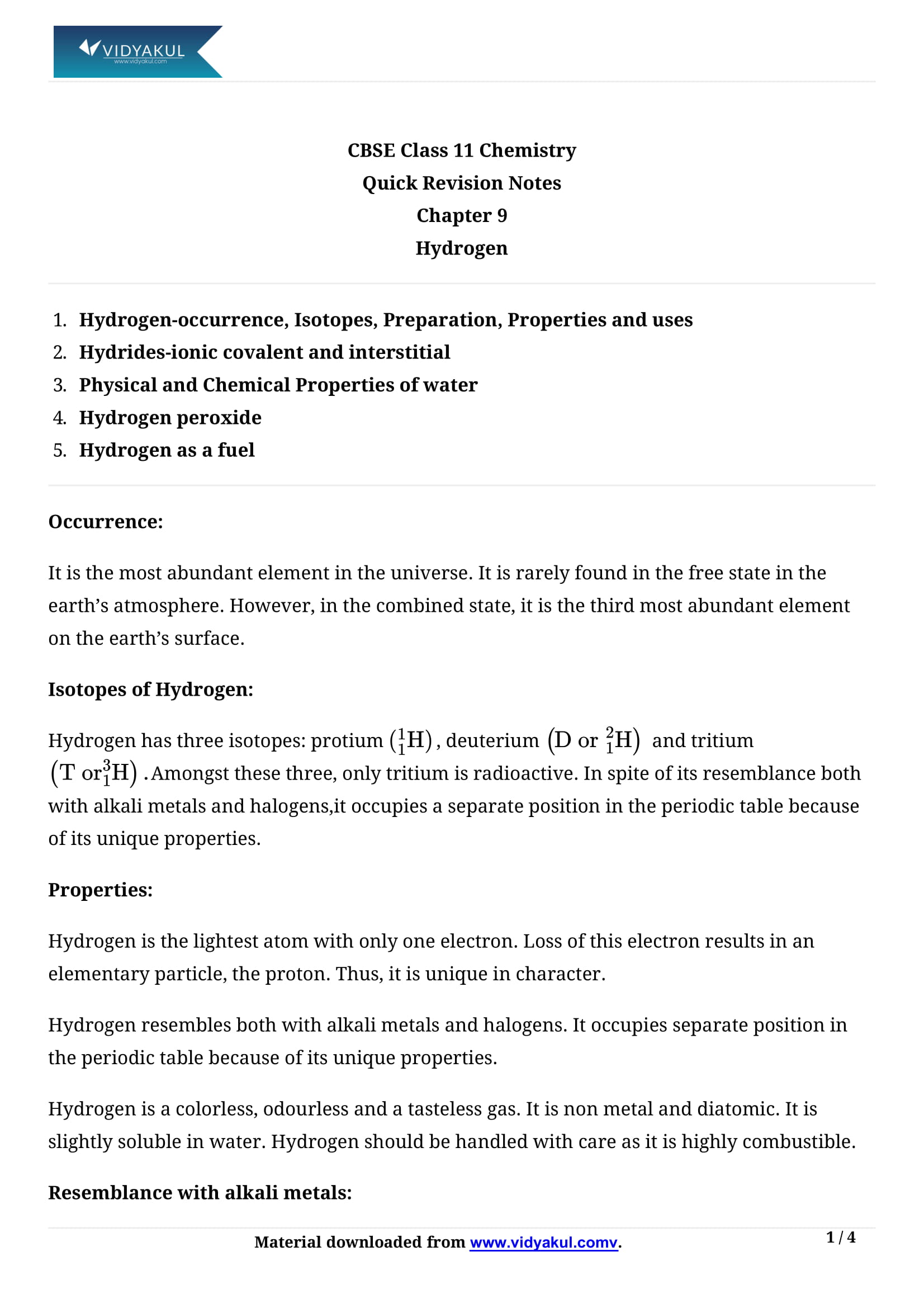Hydrogen Class 11 Notes

Chapter 9 Hydrogen
Students can find the NCERT notes for Class 11 Chemistry Chapter 9 Hydrogen in this article. Solving NCERT notes will help students in their final exam preparation and undergraduate entrance examinations. Students need to go through the topics included in their syllabus thoroughly before they start practicing the exercise-based questions.
Vidyakul’s subject experts provide the CBSE Class 11 Chemistry NCERT notes. Students can use the 11th notes online as per their needs. Students can also get reference study material and 3D explainer videos for free. Visit Vidyakul to know more.
CBSE 11th CHEMISTRY CH-9
Points to Remember
Some of the important points to remember from the chapter are:
Position of hydrogen in the periodic table: Hydrogen is the lightest element. It shows a resemblance with halogens as well as alkali metals. It occupies the first position in the periodic table.
Hydrogen is the only element which does not have neutrons in its nucleus.
Hydrides: Hydrides are binary compounds of metals and hydrogen.
The compounds of hydrogen and s-block elements are ionic hydrides. The compounds of hydrogen and most p-block elements are covalent hydrides.
The hydrides of transition metals are non-stoichiometric compounds. They are called interstitial hydrides.
Topics and Sub-topics
NCERT Class 11 Chemistry Chapter 9 Hydrogen may seem a little difficult at the beginning. However, it will be easy to solve its questions once students practice the questions. Vidyakul provides notes for all questions in CBSE Class 11 Chemistry Chapter 9 textbooks. Students can practice these questions at Vidyakul for free to score good marks. The topics and sub-topics in NCERT notes for 11th Chemistry Chapter 9 are as below:
Frequently Asked Questions
What is the ‘Hydrogen spectrum’?
The hydrogen spectrum is an important piece of evidence to show the quantized electronic structure of an atom.
What are the uses of Hydrogen?
Hydrogen is used for fertilisers, grinding metals, and methanol to make ammonia for the manufacture of artificial materials such as plastics.
What are the main isotopes of hydrogen?
There are three isotopes of the element hydrogen: hydrogen, deuterium and tritium.
Practice Questions
How can you increase the production of dihydrogen from coal gasification?
Explain the auto-protolysis of water along with its significance.
Explain the amphoteric nature of water with chemical reactions.
Distinguish between hydration and hydrolysis.
Position of hydrogen in the periodic table: Hydrogen is the lightest element. It shows a resemblance with halogens as well as alkali metals. It occupies the first position in the periodic table.
Hydrogen is the only element which does not have neutrons in its nucleus.
Hydrides: Hydrides are binary compounds of metals and hydrogen.
The compounds of hydrogen and s-block elements are ionic hydrides. The compounds of hydrogen and most p-block elements are covalent hydrides.
The hydrides of transition metals are non-stoichiometric compounds. They are called interstitial hydrides.
What is the ‘Hydrogen spectrum’?
What are the uses of Hydrogen?
What are the main isotopes of hydrogen?
How can you increase the production of dihydrogen from coal gasification?
Explain the auto-protolysis of water along with its significance.
Explain the amphoteric nature of water with chemical reactions.
Distinguish between hydration and hydrolysis.
Learn more about the same in Hydrogen Class 11 Notes pdf.
Download this solution for FREE Download this PDF







